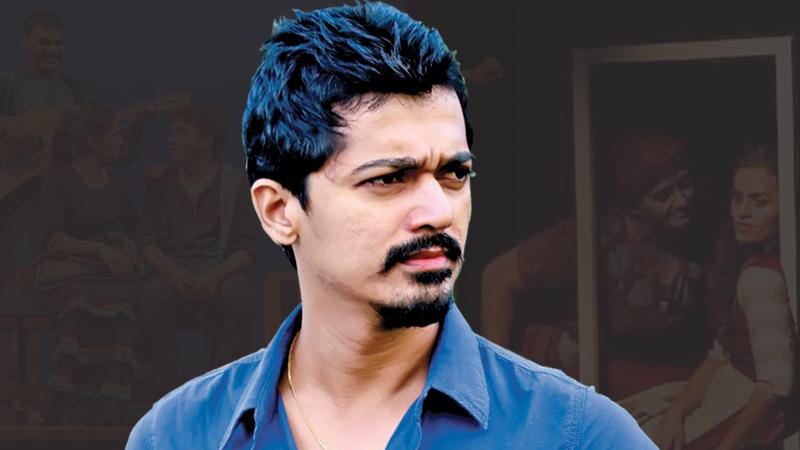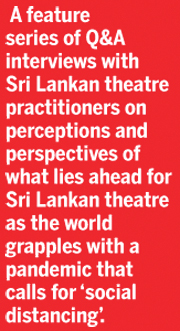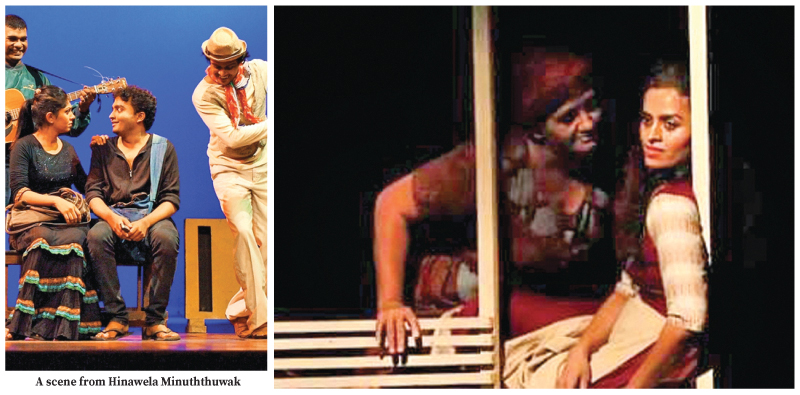
In this twelfth and final instalment of The State and Fate of Theatre I bring to the readers of the Sunday Observer the views and perceptions of a very talented young theatre practitioner of the Sinhala stage who has over the years dedicated himself to the art of theatre as a playwright and director as well as a teacher of drama and theatre.
 A BA graduate from the University of Kelaniya, from which university he also obtained an MA in Drama, his body of work reflects different genres capturing diverse themes such as olden historical themes as found in his Sinhala musical plays Giri Kuta Kashyapa and Guththila Kavya (which I reviewed in the issues of November 20, 2016 and March 4, 2018 of the Sunday Observer) as well as plots and themes set in modern contexts that deal with social issues with a mix of humour, romance and contemplativeness such as his play Hinawela Miniththuwak (which I reviewed in the May 1, 2016 issue of the Sunday Observer). His latest stage play Rathu Magul Kapuwa was nominated in the Best Drama and Best Director categories in the State Drama Festival 2020, winning no less than seven awards including the Award for Best Actor and Best Supporting Actress. And thus, with pleasure, I present to the readers of the Sunday Observer, in this concluding chapter of this feature series, the thoughts voiced by Akila Sapumal on the state and fate of theatre in Sri Lanka as the world grapples with the impacts of a global pandemic.
A BA graduate from the University of Kelaniya, from which university he also obtained an MA in Drama, his body of work reflects different genres capturing diverse themes such as olden historical themes as found in his Sinhala musical plays Giri Kuta Kashyapa and Guththila Kavya (which I reviewed in the issues of November 20, 2016 and March 4, 2018 of the Sunday Observer) as well as plots and themes set in modern contexts that deal with social issues with a mix of humour, romance and contemplativeness such as his play Hinawela Miniththuwak (which I reviewed in the May 1, 2016 issue of the Sunday Observer). His latest stage play Rathu Magul Kapuwa was nominated in the Best Drama and Best Director categories in the State Drama Festival 2020, winning no less than seven awards including the Award for Best Actor and Best Supporting Actress. And thus, with pleasure, I present to the readers of the Sunday Observer, in this concluding chapter of this feature series, the thoughts voiced by Akila Sapumal on the state and fate of theatre in Sri Lanka as the world grapples with the impacts of a global pandemic.
Q. Did the lockdown halt any theatre activities you had planned and were in the course of putting into action? How much of a backlash has the current pandemic situation caused your plans as a theatre artiste and practitioner?
A. When the lockdown started in mid March it was completely unexpected, and I was in the middle of preparing to debut my latest creation for the Sinhala stage. My latest production is a version of Kalidasa’s Sanskrit classic Shakuntala. My play is titled Saakunthalaya. It was ready to debut on March 21 at the Lionel Wendt this year. Also there were performances scheduled for March 15 and 16 of two Greek plays translated to Sinhala by Ariyawansa Ranaweera, which I have directed.
Those shows also got cancelled. There was also a new comedy play titled Udarata Kolla which I was going to debut during those months. Both Udarata Kolla and Saakunthalaya had producers ready to take the shows forward. So as you can imagine it was a big setback for me as a theatre practitioner when you look at how the lockdown affected my plans during that time. But of course even though it was considerable hardship it is clear the lockdown was needed and that it was the right decision since the measures have been very effective to prevent the pandemic spreading in the country.
Q. How has the post lockdown situation been for you to get your work in theatre back on track?
A. We started rehearsals for Udarata Kolla in August and I am hopeful that we will be able to debut it in February next year. I am hopeful of debuting Saakunthalaya also in early 2021. At present when we look at how the Preksha Theatre Festival, sponsored by the State has been successful to revive public interest to watch stage plays, after public entertainment was halted during the lockdown, it is clear that what is needed to attract theatregoers is effective communication from the mass media.
I was happy to see when my play ‘Hinawela Miniththuwak’, shown on Monday September 14 as part of the Preksha Festival went on the boards, we had about two hundred in the audience, and many of them were new viewers who were there to watch the play for the first time. That is something special to note. Yes, certainly it will take effort to get things back on track but I believe that true theatre fans will be ready to support our efforts by coming to watch our shows when we bring the works to life on the boards.
Q. As a theatre practitioner what kind of support would you like to see come forth from the State to support theatre in the years ahead?
 A. As theatre practitioners we don’t have budgets to advertise our shows on mainstream media in a big way. Therefore, the patronage of media institutions is needed to create an effective stream of communication to the public about what stage plays are being performed, where and when. People think that social media is a very effective platform to advertise but that is only partly true. When I share a post about an upcoming play it will get shared among my friends and their network but may not necessarily be seen by the larger target audience.
A. As theatre practitioners we don’t have budgets to advertise our shows on mainstream media in a big way. Therefore, the patronage of media institutions is needed to create an effective stream of communication to the public about what stage plays are being performed, where and when. People think that social media is a very effective platform to advertise but that is only partly true. When I share a post about an upcoming play it will get shared among my friends and their network but may not necessarily be seen by the larger target audience.
One of the main tools that can support us is the State television. We have two precious assets in that regard, the ITN and the Rupavahini. On Rupavahini we have Ranga Bhoomi as a show dedicated to promoting theatre but that is also of a format not in sync with present times and trends.
Its format and content presentation needs to improve in my opinion. If more attractive approaches to project drama and theatre in new formats were devised for Ranga Bhoomi I believe more television viewers would be encouraged to come to watch stage plays.
Most of the currently popular screen actors act in Sinhala plays and that is one factor that can be used to make TV shows on drama and theatre, and popularise them to the public.
If ITN and Rupavahini could each dedicate two hours each every week to promote stage plays that would be a great benefit for the theatre community. Efforts like the Prekasha Theatre Festival are very helpful and I salute those efforts.
Similarly, if State media can give a more concentrated push, that is, the electronic and print media, to promote a theatre culture with regular theatre related news and articles and create awareness about the shows and performances it would help theatre to go forward in the next few years despite the challenges we are facing.
Q. Looking at the next two to three years, what do you think are the chances for theatre to progress in Sri Lanka amidst a global pandemic that has impacted the world economy negatively?
A. Seeing as how the steps taken by the government to bring the pandemic situation under control with the lockdown policy were successful, and how, by and large, the general public in Sri Lanka have been cooperative to adhere to the health department regulations, hopefully there will be no need for lockdowns in the future.
On that basis I personally think that there is hope for theatre in Sri Lanka to continue without suffering a breakdown. We as theatre practitioners cannot survive on theatre alone as the income is not sufficient to rely on that alone.
Most of us usually have some other job as well and drama and theatre in Sri Lanka has always been able to continue despite financial hardships. So if we can successfully keep things going without a need for another lockdown, I think the chances are positive for Sri Lankan theatre to sustain.
One of the biggest setbacks for us as theatre practitioners happened after the Easter Sunday attacks last year. Many people were afraid to go to a theatre wondering if that place might be a target for terrorist attacks. But despite those scares we as a country continued in our cultural life without allowing a total breakdown of the presence of the arts in public life. Sri Lankan theatregoers are an intelligent crowd.
That is what I believe. Those who have a love for theatre don’t mind setting aside a little money to buy a ticket to watch a stage play once a month even though the economy may not be doing excellently. In that sense I think if we can ensure the regulations by the health authorities are followed correctly at all times, and an effort it made by artistes and organisers to have performances, the theatregoing public will be with us.
If we as a country ensure that we can go forward without letting the pandemic take hold of us and cause a national health crisis, then I believe it will be possible for theatre to continue to be part of public entertainment in the years ahead.

